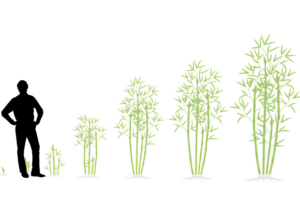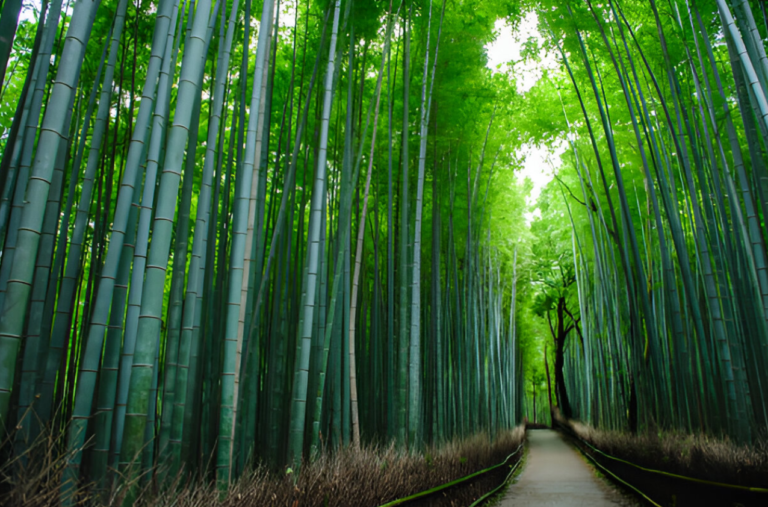Did you know bamboo can grow over 35 inches in a single day? This incredible growth rate makes bamboo one of the fastest-growing plants on Earth, sparking interest in its ecological benefits and sustainable uses across various industries.
Why Bamboo Grows 35 Inches Daily and How It’s Possible?
Bamboo’s remarkable growth is due to its unique underground rhizome system and cellular structure, which enable it to expand at unprecedented rates. Unlike most plants that grow primarily from their tips, bamboo grows from nodes along the entire length of its stem, allowing multiple points of expansion simultaneously. In fact, the fastest-growing species, such as Moso bamboo and Guadua bamboo, are known to shoot up by inches every hour under optimal conditions, like those found in humid, tropical climates.
To understand the full impact of this growth phenomenon, consider that some species, like Moso bamboo, hold the Guinness World Record for plant growth, reaching over 35 inches in just 24 hours. This rapid rate of growth makes bamboo an essential subject of study in sustainable agriculture and renewable resource management.
Ideal Conditions for Bamboo Growth
Bamboo thrives best in humid, tropical climates with well-drained, nutrient-rich soil. This plant’s adaptability also allows it to grow in temperate zones, although its growth rate may be slower. The ideal climate includes steady rainfall, warm temperatures, and a growing season that can support bamboo’s natural growth patterns.
For those curious about boosting growth in home gardens, natural fertilizers can greatly aid in providing essential nutrients. Learn more about using natural resources like burying fish scraps as fertilizer for a thriving garden that mimics bamboo’s ideal growing conditions.
Environmental Benefits of Bamboo Growing Over 35 Inches in a Single Day

Bamboo’s fast growth is more than an interesting fact—it has meaningful implications for the environment. Bamboo is an incredible carbon sink, absorbing large amounts of carbon dioxide while releasing oxygen. This helps combat climate change and enhances air quality. Its extensive root system also stabilizes soil, reducing erosion, which is especially valuable in areas prone to heavy rains.
- Carbon Sequestration: Bamboo sequesters more carbon than many trees, making it a key ally in the fight against global warming.
- Soil Stabilization: The plant’s roots strengthen soil, helping prevent landslides and erosion in areas with high rainfall.
- Biodiversity: Bamboo forests support diverse wildlife, providing habitats for various species, especially in Asia.
Bamboo’s role in environmental conservation aligns well with other sustainable practices in gardening. For example, creating compost from kitchen waste, similar to making manure tea, enriches the soil and mirrors the natural fertilization processes that benefit bamboo.
Bamboo’s Growing Importance in Industry
Due to its rapid renewability and strength, bamboo has become a highly sought-after material across different sectors. Here are some key uses:
- Construction: Bamboo’s strength rivals that of steel in terms of tensile strength, making it ideal for building frameworks, flooring, and scaffolding.
- Textiles: Bamboo fibers can be processed into soft, sustainable fabrics used in clothing and upholstery.
- Paper and Packaging: Bamboo offers an eco-friendly alternative to traditional wood-based paper, and it’s commonly used in sustainable packaging.
The adaptability and strength of bamboo make it one of the most versatile plants available for sustainable production, reducing the need for slower-growing hardwoods and helping meet global resource demands.
Challenges of Cultivating Fast-Growing Bamboo
While bamboo is incredibly beneficial, cultivating it does come with challenges:
- Environmental Sensitivities: Bamboo can be invasive, especially in areas where it’s not native, outcompeting local plants if not carefully managed.
- Nutrient Demands: Despite its hardiness, bamboo can exhaust the nutrients in soil, requiring crop rotation or fertilization to maintain balance.
- Space Requirements: Bamboo’s expansive growth requires ample space, which may limit its use in smaller gardens or urban landscapes.
If you’re planning on integrating bamboo into a home garden, it’s essential to consider these factors. For more ideas on how to introduce large plants into your landscape effectively, see must-plant trees to line your driveway, which provides alternatives for those seeking impactful plants that require less intensive management than bamboo.
FAQs About Bamboo’s Rapid Growth
- How fast can bamboo really grow in a day?
Certain bamboo species can grow up to 35 inches in a single day, though this rate varies based on environmental conditions and species. - Which bamboo species grows the fastest?
Moso bamboo and Guadua bamboo are among the fastest-growing species, achieving exceptional heights rapidly. - How does bamboo compare to traditional wood as a building material?
Bamboo is highly renewable and has strength comparable to some woods and even steel, making it a strong, sustainable choice in construction. - Can bamboo be invasive?
Yes, some bamboo species spread aggressively, which can lead to issues if not managed with barriers or regular pruning. - What are bamboo’s ecological benefits?
Bamboo sequesters carbon dioxide, stabilizes soil, and supports biodiversity, making it a powerful ally in environmental conservation.
The Future of Bamboo in Sustainable Practices
As more industries explore sustainable alternatives, bamboo is likely to play a larger role in reducing deforestation, carbon emissions, and reliance on non-renewable resources. With its unparalleled growth rate and myriad uses, bamboo is not just a fast-growing plant but a sustainable solution for the future.
From its environmental benefits to its industrial applications, bamboo stands as a testament to nature’s ability to meet human needs sustainably. Incorporating bamboo in more areas of production and daily use aligns well with a greener, eco-conscious world, supporting sustainable living for generations to come.
